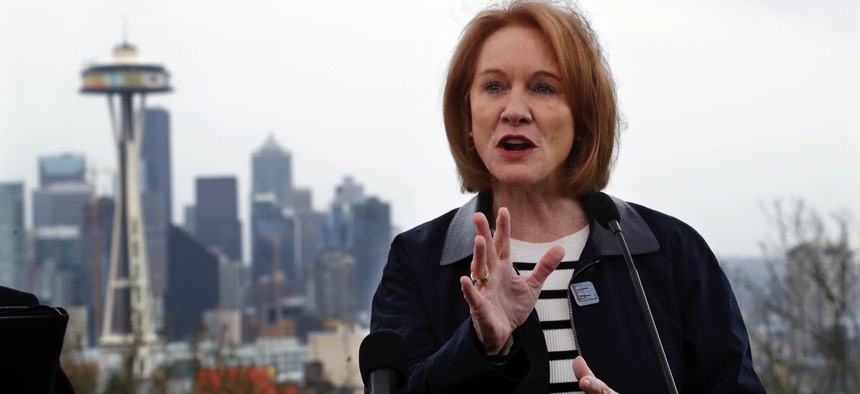DOJ Slowly Releasing 2017 Public Safety Funds to ‘Sanctuary Cities’

Seattle Mayor Jenny Durkan Elaine Thompson / AP Photo

Connecting state and local government leaders
Even though some localities are just now receiving their Byrne JAG grants, the battle for 2018 awards is well underway.
The U.S. Department of Justice is releasing 2017 public safety funds previously withheld from sanctuary cities incrementally—Seattle being the latest to receive its $252,157 award.
DOJ ceased distribution of more than $250 million in Byrne Memorial Justice Assistance Grants, which are typically approved in October and used by local law enforcement to combat everything from gun crime to gang violence.
Seattle was among the jurisdictions that sued when DOJ attempted to place new conditions on Byrne JAG grants to make cities help enforce federal immigration law. And recently federal judges have upheld two injunctions blocking enforcement of the additional requirements in the cases of U.S. Conference of Mayors member cities and California jurisdictions.
“That’s why we’re starting to see this money come in,” Amanda Kellar, associate counsel for the International Municipal Lawyers Association, told Route Fifty. “There’s still many in limbo, so that’s frustrating.”
Seattle received its award because it’s a USCM member, even though that case is being appealed in the 7th Circuit, said a spokesman for DOJ.
Not all cities are USCM members or located in California, which has created tiers of Byrne JAG recipients, Kellar said.
States, counties, cities and towns outside USCM and California must still accept DOJ’s 2017 anti-sanctuary city grant conditions, barring a separate ruling, prior to receiving their awards, according to the Office of Justice Programs. The stipulations require state and local governments to prove they don’t restrict the sharing of people’s immigration statuses with federal law enforcement, release criminal undocumented immigrants from custody without providing notice, or prohibit the Department of Homeland Security from accessing their jails.
U.S. Attorney General Jeff Sessions has argued the requirements help Immigration and Customs Enforcement enforce laws already on the books, while saying that “sanctuary” policies make communities less safe. Mayors, though, counter that the requirements essentially force them into immigration enforcement, which diverts officers’ attentions from crime fighting efforts.
In January, DOJ put 23 jurisdictions—including Seattle’s own King County, Washington—on notice for potentially violating the new conditions. The city received its 2017 award by letter on Wednesday.
“While this is a victory for Seattle and safer communities, we are not done. We will continue to stand up against President Trump or anyone who assaults our constitutional powers and shared values,” said Mayor Jenny Durkan in a statement. “True public safety protects all, including immigrants and refugees seeking the promise of America.”
But not all jurisdictions in California have seen the funding they’re due, and DOJ has already filed a motion to amend Northern District of California Judge William Orrick’s ruling, Kellar said.
Seattle’s victory is further short-lived because DOJ has already issued 2018 Byrne JAG awards, and it’s notably excluded from the list.
“Many of the jurisdictions that have taken a stronger stance against the administration are not included in the award,” Kellar said.
DOJ has once again added its conditions to the grants, along with the addition of a fourth prohibiting recipients from preemptively alerting the public to federal law enforcement activity, which the agency argues is a violation of 8 U.S. Code 1374. The criminal statute was enacted to combat human trafficking, not undocumented immigration, but its use is likely being expanded after Oakland, California Mayor Libby Schaaf tipped off residents to an ICE raid earlier this year, Kellar said.
Unlike with the 2017 Byrne JAG grants, no injunctions have been issued for the 2018 funds—although Los Angeles and Chicago are seeking preliminary ones.
Because of the appeals in Chicago’s original case, Philadelphia’s Byrne JAG suit is now furthest along in terms of a potential U.S. Supreme Court petition—and even that’s not likely before 2019, Kellar said. Should DOJ ultimately win, 2017 funds could be clawed back.
Seattle plans to use its 2017 money to fund three crime prevention coordinators, who work with analysts to identify crime trends and communicate with residents in addition to organizing block watch programs.
“This is funding that jurisdictions can use for really important criminal justice purposes … for basically creating positions that otherwise wouldn’t be available to help with policing, recidivism and juvenile justice,” Kellar said.
Dave Nyczepir is a News Editor at Government Executive’s Route Fifty and is based in Washington, D.C.

NEXT STORY: In Shift, States Step in on Affordable Housing





